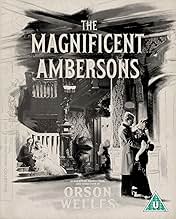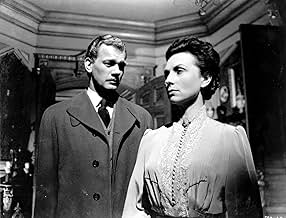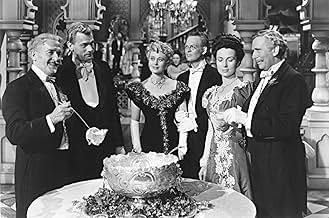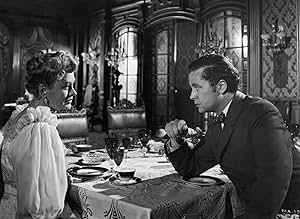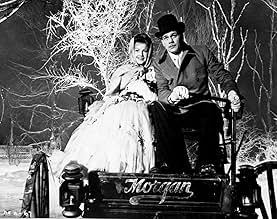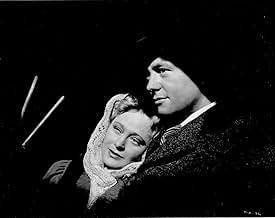IMDb-BEWERTUNG
7,6/10
27.540
IHRE BEWERTUNG
Füge eine Handlung in deiner Sprache hinzuThe spoiled young heir to the decaying Amberson fortune comes between his widowed mother and the man she has always loved.The spoiled young heir to the decaying Amberson fortune comes between his widowed mother and the man she has always loved.The spoiled young heir to the decaying Amberson fortune comes between his widowed mother and the man she has always loved.
- Für 4 Oscars nominiert
- 4 Gewinne & 4 Nominierungen insgesamt
Orson Welles
- Narrator
- (Synchronisation)
Edwin August
- Citizen
- (Nicht genannt)
Georgia Backus
- Matron
- (Nicht genannt)
Harry A. Bailey
- Citizen
- (Nicht genannt)
Olive Ball
- Mary - Maid
- (Nicht genannt)
Jack Baxley
- Reverend Smith
- (Nicht genannt)
William Blees
- Young Man at Accident
- (Nicht genannt)
Lyle Clement
- Citizen
- (Nicht genannt)
Bobby Cooper
- George Minafer as a Boy
- (Nicht genannt)
Don Dillaway
- Wilbur Minafer
- (Nicht genannt)
Handlung
WUSSTEST DU SCHON:
- WissenswertesOne of former silent star Dolores Costello's last roles. She was forced to retire from the film business as her face had become badly scarred by early film makeup, which was highly caustic.
- PatzerTowards the end of a long tracking shot with George and Lucy in a horse-drawn carriage, a portion of the rear end of a camera car and some sort of filmmaking equipment briefly enter the left side of frame.
- Crazy CreditsAll of the credits except the RKO logo, the film's title and the copyright notice are recited orally (by Orson Welles) at the end of the film, not written out onscreen. As Welles recites the names of the production crew, items are seen, such as a motion picture camera when he says "Director of Photography", a pair of hands turning knobs as he says the words "Sound Recording By", etc.
- Alternative VersionenFrom "Magnificent Obsession," a Vanity Fair article by David Kamp from April 2000: "On March 11, Robert Wise sent a 132-minute composite print (a print with picture and soundtrack synchronized) to Rio for Orson Welles to review. This is the version that scholars and Wellesophiles consider to be the 'real' Magnificent Ambersons. Curiously enough, the first blow against this version was dealt not by RKO but by Welles himself. Before he'd even received the composite print, he impulsively ordered Wise to cut 22 minutes from the middle of the film, mostly scenes concerning George Minafer's efforts to keep his mother and Eugene apart. Wise complied, and on March 17, 1942, The Magnificent Ambersons, in this form, had its first preview screening, in the Los Angeles suburb of Pomona. Sneak previews are a notoriously unreliable gauge of a film's worth and potential for success, and RKO did The Magnificent Ambersons a particular disservice by previewing it before an audience composed mostly of escapism-hungry teenagers, who had come to see the movie at the top of the bill, The Fleet's In, a feather-light wartime musical starring William Holden and Dorothy Lamour".
- VerbindungenEdited into Geschichte(n) des Kinos: Une histoire seule (1989)
- SoundtracksThe Man Who Broke the Bank at Monte Carlo
(1892) (uncredited)
Music and Lyrics by Fred Gilbert
Sung a cappella by Joseph Cotten, Dolores Costello, Anne Baxter,
Tim Holt, Agnes Moorehead and Ray Collins
Ausgewählte Rezension
I think I'd give just about anything to see a restored version of this film, like "Touch of Evil."
Its reputation is quite justified, however, and the top critics of today have generally agreed that it's one of Welles' best efforts as director. Some have even said that, scene for scene, it's a better film than "Citizen Kane."
The opening montage, set to Welles' narration, is as good as anything of its kind that's been done before or after -- brilliantly, and I hate to use that word because it's so often overused, it achieves two things: 1) it sets up the dramatic side of the story, with Eugene's fawning for and losing the affections of Isabel, and 2) putting us in a specific, historical time and place. The story of George Minafer's downfall parallels the changing times of America during that time, as well as American aristocracy.
Then there's Agnes Moorehead, who does the most amazing work as Fanny Minafer, George's aunt. She's a pressure cooker to begin with, but when the Ambersons hit rock-bottom she lets go, in a torrential, hysterical performance that's still getting praise today.
"The Magnificent Ambersons" also carries an equally dramatic story of Hollywood's assault on artistic expression; almost everyone knows that RKO seized the film and cut it to pieces while Welles was out doing his documentary "It's All True." Today there's other ways for great directors (Kubrick, Altman) to dodge the system, but film stock and equipment in those days could only be procured from big studios, and for the remainder of Welles' career his genius would only be seen fleetingly (his adaptations of Shakespeare, Kafka's "The Trial"). It's a story as tragic as George Minafer's.
Its reputation is quite justified, however, and the top critics of today have generally agreed that it's one of Welles' best efforts as director. Some have even said that, scene for scene, it's a better film than "Citizen Kane."
The opening montage, set to Welles' narration, is as good as anything of its kind that's been done before or after -- brilliantly, and I hate to use that word because it's so often overused, it achieves two things: 1) it sets up the dramatic side of the story, with Eugene's fawning for and losing the affections of Isabel, and 2) putting us in a specific, historical time and place. The story of George Minafer's downfall parallels the changing times of America during that time, as well as American aristocracy.
Then there's Agnes Moorehead, who does the most amazing work as Fanny Minafer, George's aunt. She's a pressure cooker to begin with, but when the Ambersons hit rock-bottom she lets go, in a torrential, hysterical performance that's still getting praise today.
"The Magnificent Ambersons" also carries an equally dramatic story of Hollywood's assault on artistic expression; almost everyone knows that RKO seized the film and cut it to pieces while Welles was out doing his documentary "It's All True." Today there's other ways for great directors (Kubrick, Altman) to dodge the system, but film stock and equipment in those days could only be procured from big studios, and for the remainder of Welles' career his genius would only be seen fleetingly (his adaptations of Shakespeare, Kafka's "The Trial"). It's a story as tragic as George Minafer's.
- Jaime N. Christley
- 28. Juli 1999
- Permalink
Top-Auswahl
Melde dich zum Bewerten an und greife auf die Watchlist für personalisierte Empfehlungen zu.
- How long is The Magnificent Ambersons?Powered by Alexa
Details
- Erscheinungsdatum
- Herkunftsland
- Sprache
- Auch bekannt als
- The Magnificent Ambersons
- Drehorte
- Produktionsfirma
- Weitere beteiligte Unternehmen bei IMDbPro anzeigen
Box Office
- Budget
- 850.000 $ (geschätzt)
- Laufzeit1 Stunde 28 Minuten
- Farbe
- Seitenverhältnis
- 1.37 : 1
Zu dieser Seite beitragen
Bearbeitung vorschlagen oder fehlenden Inhalt hinzufügen

Oberste Lücke
By what name was Der Glanz des Hauses Amberson (1942) officially released in India in English?
Antwort

